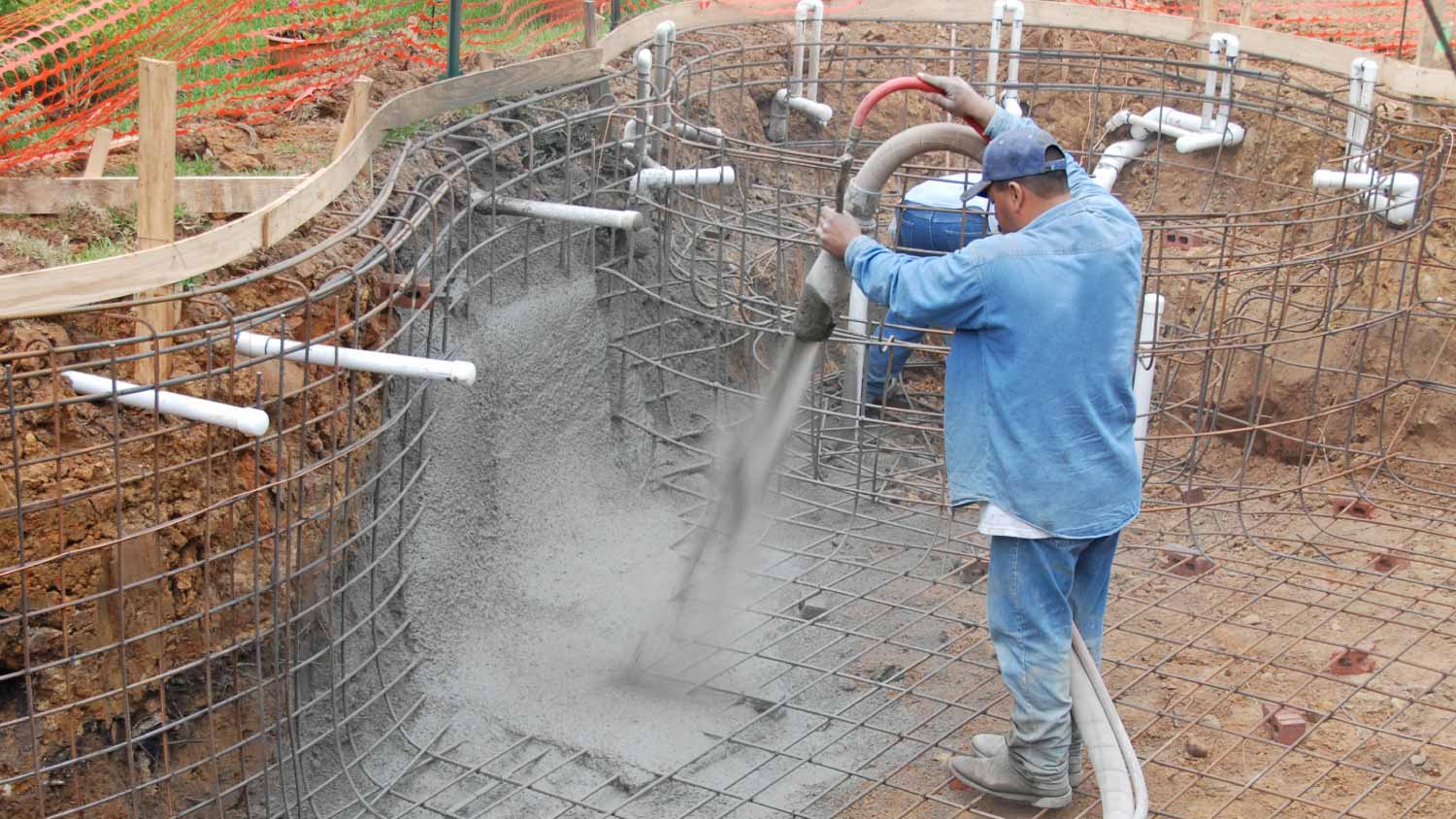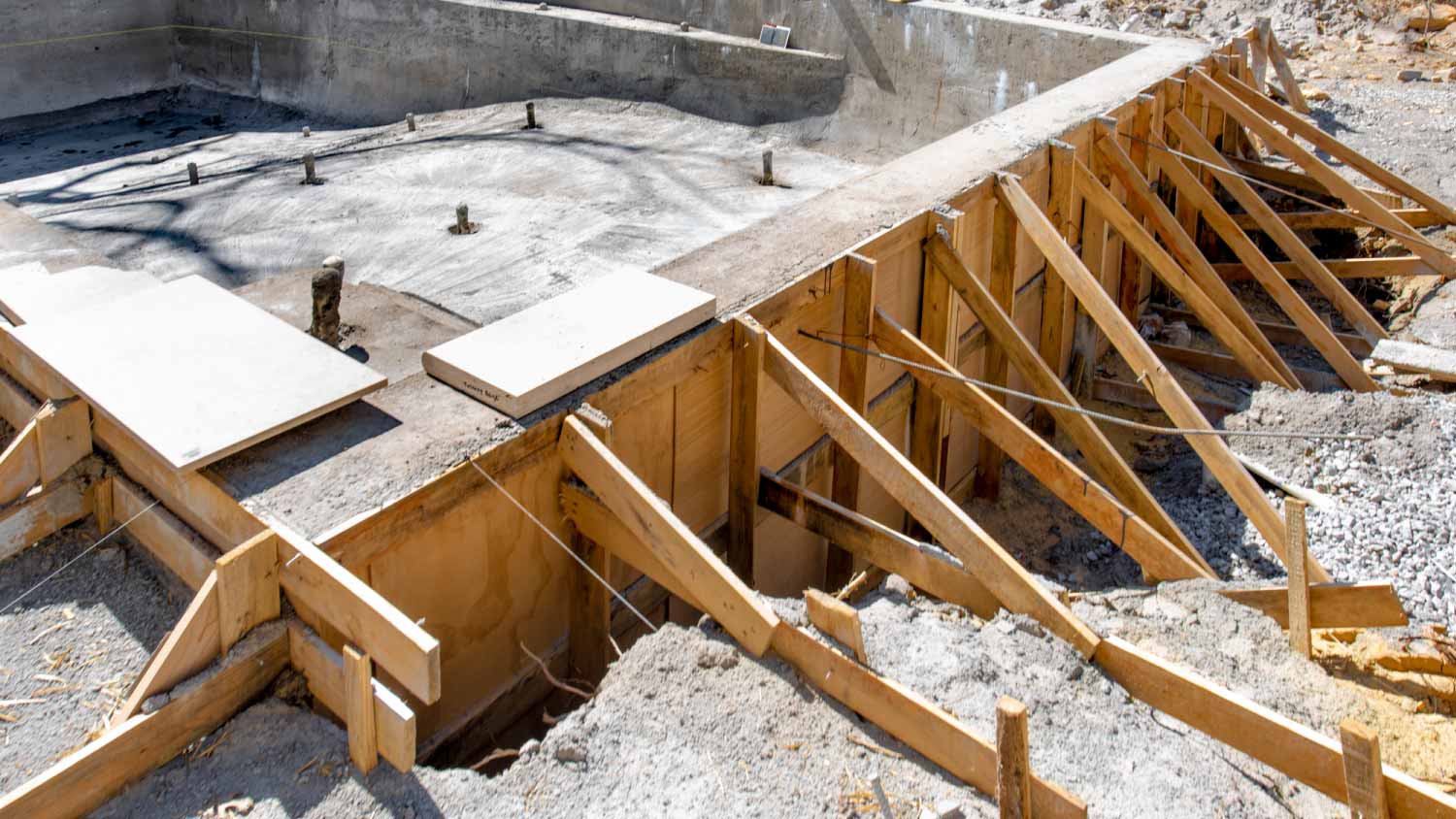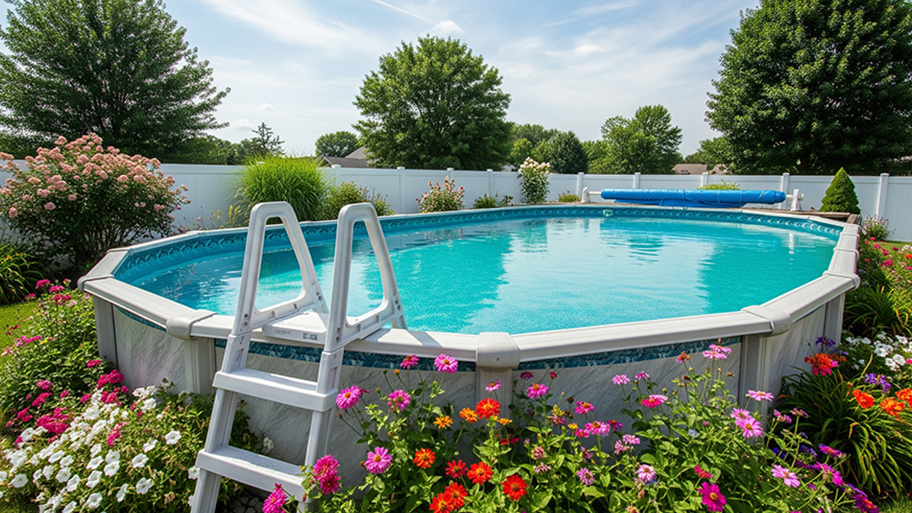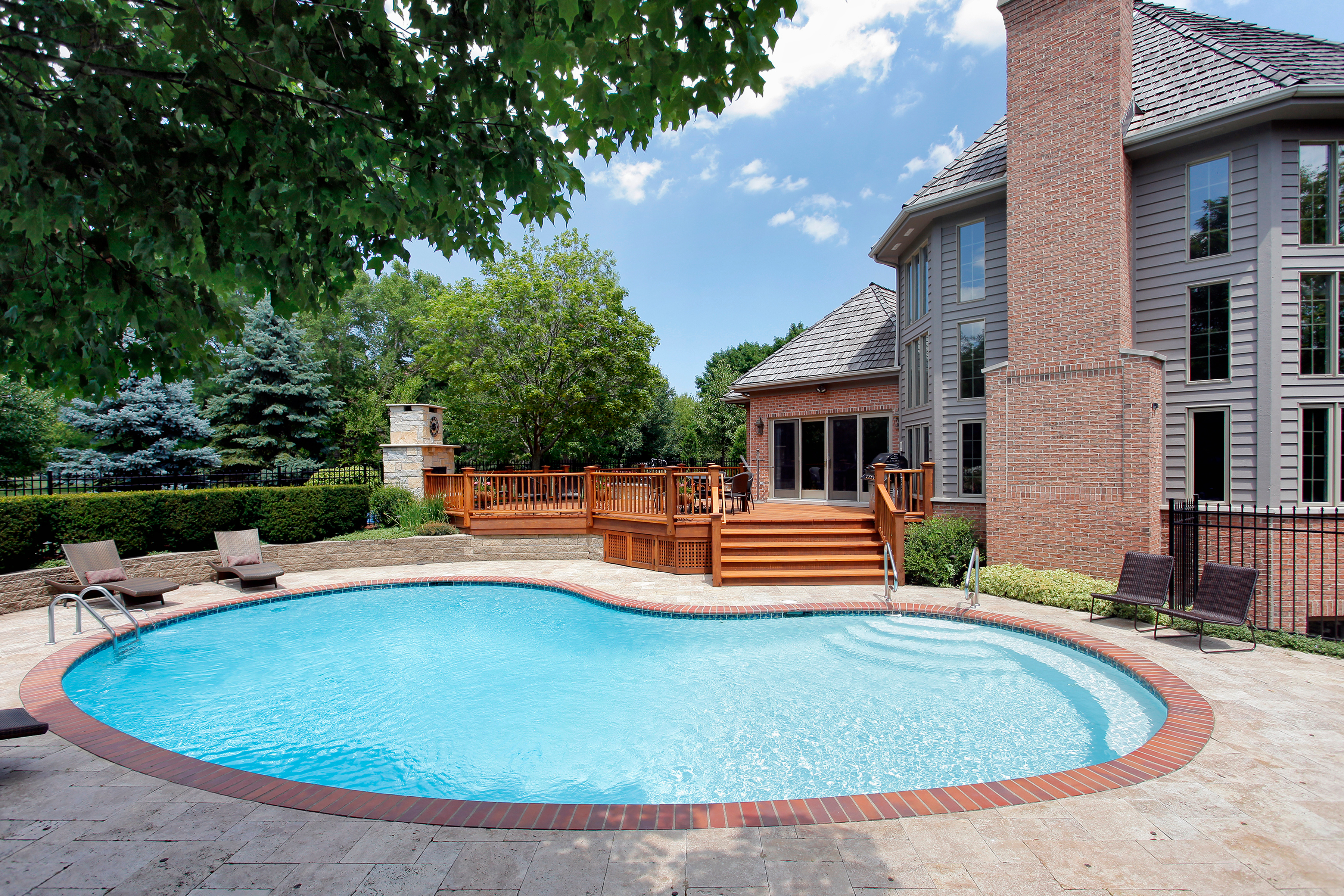
Need to know what pool resurfacing costs? Use this handy guide to get an accurate estimate for your project and see what factors can affect your total.
Find the right pro to build the pool of your dreams


Hiring the right pool builder involves asking detailed questions about their business and your project.
Verifying a builder’s business status and practices can help protect you, your property, and your finances.
Reputable pool builders will be able to provide you with extensive information about themselves and your project.
If you dream of stepping out into your backyard and diving into your ideal pool, you’ll need to find the right pool builder to make that dream a reality. Knowing what questions to ask a pool builder during the hiring process can ensure you find the right fit and may save you some serious headaches down the road. Use our 15-question guide to find the right pool builder for the job.
When it comes to putting in a pool, you want to be sure that you’re working with an experienced pool builder and that they have a verifiable business history. Knowing how long they’ve been in business will give you an idea of their experience, and finding out about previous business names or past owners can help assure you of business consistency and clue you in to potential red flags like past bankruptcies.
A business name or ownership change isn’t necessarily a red flag on its own, but it is a good sign that you should do some further research into the company so you know exactly who you’ll be working with.

One of the most important questions to ask a pool contractor is if they can provide references from clients with pools like yours. Years in business can tell you a lot about a pool builder, but you’ll also want to ask about their experience building types of pools similar to yours. If most of their projects have been fiberglass pools and you’re looking for a concrete pool, that builder may not be the right match for your project. A builder with experience with similar projects will be able to offer advice and expertise on everything from choosing a pool design to identifying factors on your property that may pose challenges.
References from previous customers can also give you valuable information about the company’s business practices and client satisfaction. If the builder can only provide a few references but has built a lot of pools, there may be issues that other clients have experienced that prevent them from providing a positive review.
Building a pool takes time, and your backyard may be out of commission for months while your pool is being built. Asking your builder about an estimated timeline, including the best time to build your pool, can help you plan around the disruption and give you an idea of when you’ll finally start being able to enjoy your new pool.
If a builder provides you with a much shorter timeline than you’re expecting, or if you get multiple quotes and one projected timeline doesn’t match up with the others, that might clue you in that the builder isn’t being realistic about the scope of the project, which could be a sign that other issues may arise.

Budgeting for the cost of an inground pool is no small matter. Before getting started, your builder should be able to give you a comprehensive quote for the cost of building your pool, including permitting fees, excavation, materials, and labor. Again, a quote that’s much lower than others may be a red flag that you’re going to get hit with unexpected costs once the project is underway.
The quote your builder supplies should be detailed, and they should be able to explain any line items you don’t understand. A builder who isn’t transparent about what they’re charging and who won’t take the time to explain it to you may have less-than-savory business practices in other ways.
The payment schedule and amounts should be clearly laid out for you, with the balance of the payment due upon completion of the project. A builder who requires full payment up front or who doesn’t clearly spell out the financial obligations on either side of the contract may not be the best person to entrust with your money.
In addition, you’ll want to ask about lien waivers for suppliers and subcontractors. That way, if your builder fails to pay their own bills, their suppliers and subcontractors can’t put a lien on your property to recover that lost money. A reputable builder should have no issue providing you with these waivers for your protection.

Your contract should be as thorough and comprehensive as possible, including provisions for potential issues the builder may encounter. Any excavation risks running into a surprise, such as a buried rock outcropping, once you break ground. Be sure to find out if your contract covers or has an allowance for handling these kinds of issues or if you’ll need to come up with additional funds.
Additionally, make sure that your contract clearly spells out who’s responsible for which parts of the project. You don’t want there to be any confusion about whose responsibility any part of the job is. A clear, comprehensive contract serves as protection for both you and the builder and can help the build go smoothly.
Once your pool is built, you’ll want some assurance that if something goes wrong or if any parts are defective, you can have the problem fixed. Building a pool involves a lot of components, so you’ll want to verify any warranties for parts and equipment. In addition, find out if your pool builder offers a warranty on their work, and get the details of that warranty, including:
How long the work is covered for
What work is covered
The process for making a warranty claim
Any exceptions to the warranty
Having all of this information in writing will make it easier for you to quickly address an issue or know if you need to contact a local pool repair service instead of your builder.

Knowing what suppliers your builder works with can offer some clues as to their work practices. If they tend to use the same suppliers for most of their projects, you can likely assume that your builder pays their suppliers on time and has a good working relationship with them.
Builders who only use suppliers once or twice or who aren’t willing to provide you with that information may have business practices that make suppliers unwilling to work with them on a regular basis, and that can be a red flag.
Building a pool involves heavy equipment, work crews, excavation, and a lot of alteration to your property. You’ll want to be absolutely certain that your pool builder has the appropriate insurance and liability coverage so that if something unexpected happens in the course of building, it’ll be covered. Your builder should also carry workers’ compensation coverage in case anything happens to one of their employees or subcontractors on the job.
A reputable builder will be able to provide you with their insurer information so that you can contact them and confirm that their coverage is active. Most builders will have a copy of their certificate of insurance, but it’s a good practice to reach out directly to the insurer to verify current coverage.
While it would be nice if every pool build was completed on time and on budget, that’s often not the case. A good pool builder will have contingency plans for everything from defective components to delayed suppliers, and will let you know how they deal with these issues as they arise in order to get the project back on track.
Different pool contractors specialize in different types of pools and pool remodels. Most will have experience working on standard aboveground and inground pools. If you want something specialized, such as a swim spa, saltwater pool, or natural pool, you may need to seek out a specialist.
Ideally, you want to make sure that your contractor has experience building the specific type of pool you want. Ask for photos of past work to ensure you like what you see.
When it comes to pool construction, size matters. It won’t just impact the price, but also the look of your backyard. Come to your contractor armed with your yard’s dimensions and be ready to discuss pool sizes and shapes. They can help you run through the options.
The standard inground pool ranges from 10- to 20-feet wide by 20- to 40-feet long. Aboveground pools, which come in rectangular or circular shapes, are usually smaller. Inground pools allow for greater customization in shape, but it comes at a cost.
Some of the most important questions to ask a pool contractor involve your specific location. Your pool will be impacted by environmental factors, and a local expert will understand how to mitigate them. For example, it’s difficult to install an inground pool on clay soil because it’s prone to expansion. In this case, you may need to over excavate and replace the soil with a more suitable type. If you live in an area with cold winters, you’ll need to choose the appropriate materials that can withstand the thaw and freeze cycle. Your pool may even need reinforcements.
The materials you choose for your pool determine its lifespan. Fiberglass pools can last 30 years, while vinyl pool liners need to be replaced after about a decade. Concrete and tile can last the longest with regular repairs, but concrete will need resurfacing, and pool tiles will eventually need to be replaced or repaired.
Understanding how long the materials last and how much maintenance is required can help you decide on the right type of pool for your lifestyle and budget.
Building a pool uproots parts of your backyard, so homeowners often include it in a larger landscaping remodel. Your pool contractor can help you choose any additional landscaping and hardscaping projects to complete the build. You’ll typically need to install a fence to ensure pool safety, but you may also want to install a pool deck, plant shrubbery, plant grass seed or sod, add a water feature, or install a patio. All of this requires the work of numerous contractors or subcontractors and will impact the timeline and total cost.
From average costs to expert advice, get all the answers you need to get your job done.

Need to know what pool resurfacing costs? Use this handy guide to get an accurate estimate for your project and see what factors can affect your total.

Dreaming of summertime swimming? Find out aboveground pool costs, including prices for materials, fun extras, and professional installation.

Discover how much pool maintenance costs, including average prices, cost factors, and expert tips to help you budget and keep your pool sparkling all season.

Elevate your swimming experience with a DIY pool heater. This guide includes four methods for using the sun's energy to warm your water.

Installing a pool? Use this comprehensive pool inspection checklist before taking a plunge.

Looking for the best types of pool enclosures to cut down on cleanings? Pool enclosures come in a wide range of prices, shapes, and materials fit to your style.